
О. В. Афанасьева, И. В. Михеева, Е. А. Колесникова
ДИАГНОСТИЧЕСКИЕ РАБОТЫ
к
учебнику О. В. Афанасьевой, И. В. Михеевой, К. М. Барановой
О. В. Афанасьева, И. В. Михеева, Е. А. Колесникова
ДИАГНОСТИЧЕСКИЕ РАБОТЫ
к учебнику О. В. Афанасьевой, И. В. Михеевой, К. М. Барановой

2-е издание, стереотипное
ВЕРТИКАЛЬ
Москва
2016
удк 373.167.1:811.111 ББК 81.2Англ-922
А94
Афанасьева, О. В.
А94 Английский язык : Диагностические работы. 6 кл. : учебнометодическое пособие к учебнику О. В. Афанасьевой, И. В. Михеевой, К. М. Барановой / О. В. Афанасьева, И. В. Михеева, Е. А. Колесникова. — 2-е изд., стереотип. — М. : Дрофа, 2016. — 78, [2] с. : ил. — (Rainbow English).
ISBN 9786-358-16291-4
Диагностические работы являются составной частью УМК по английскому языку для б класса авторов О. В. Афанасьевой, И. В. Михеевой, К. М. Барановой серии «Rainbow English».
Диагностические материалы разработаны в соответствии с современными подходами к оценке учебных достижений школьников при изучении иностранного языка и обеспечивают подготовку к сдаче централизованных тестирований по окончании выпускных классов.
ИК 373.167.1:811.111
ББК 81.2Англ-922
ISBN 978-5-358-16291-4 ![]() 000 «ДРОФА», 2015
000 «ДРОФА», 2015
Дорогие учителя, школьники и родители!
![]()
Появление компонента УМК для 6 класса по английскому языку серии ”Rainbow English” — Диагностических работ связано с необходимостью системной и последовательной подготовки к новым формам оце- з нивания учебных достижений, столь масштабно внедряемых в школьную действительность.
По окончании 9 класса учащимся предстоит проходить итоговую аттестацию по английскому языку в форме основного государственного экзамена[1] . Это пособие знакомит школьников с тестовой формой контроля, которая используется в ОГЭ, а также позволяет определить:
1) может ли учащийся применять знания, навыки и умения, приобретённые на уроках английского языка, при выполнении тестовых заданий;
2) в какой степени учащийся готов к выполнению заданий в формате ОГЭ;
З) насколько качественно проработан шестиклассниками материал учебника.
Когда учителя, школьники и их родители познакомятся с диагностическими материалами, у них, вполне вероятно, могут возникнуть вопросы по использованию данного компонента УМК, так как в большинстве существующих зарубежных и отечественных учебно-методических комплексов диагностика, ориентированная на подготовку к государственной итоговой аттестации, как отдельный компонент отсутствует. Далее мы постараемся ответить на ряд вопросов, которые могут возникнуть у учителей, школьников и их родителей, использующих данное пособие.
4 Важным является понимание трёх аспектов, которые мы постараемся сформулировать в виде вопросов и ответов на них.
Прежде всего, что представляют собой тесты диагностики?
Это система заданий, разработанная в соответствии с современными подходами к оцениванию учебных достижений школьников при изучении иностранного языка. В качестве объектов контроля в них выступают все составляющие иноязычной коммуникативной компетенции. В пособии также предлагаются тестовые задания для контроля личностных и метапредметных результатов обучения, достижение которых является требованием ФГОС.
Насколько важно использовать данный компонент УМК?
Авторам представляется, что это весьма важный компонент УМК как для учителей, так и для школьников и их родителей.
• учителю пособие даёт возможность:
— регулярно проводить тестовый контроль языковых навыков, речевых умений, личностных и метапредметных достижений учащихся;
— выявлять, какой из аспектов (фонетика, лексика, грамматика, аудирование, чтение, письмо, говорение и т. д.) требует дополнительной отработки.
• Учащемуся выполнение диагностических тестов позволит чувствовать себя уверенно при сдаче итоговых экзаменов с использованием механизмов независимой оценки, когда балл выставляется независимым экспертом или на основе обработки тестового бланка машиной. Также тесты помогают в развитии способности к самоанализу, самооценке.
• Родителям пособие позволит определить, в какой 5 степени ребёнок овладел учебным материалом и есть ли у него проблемы в изучении иностранного языка.
Как лучше работать с диагностическими материалами (тестами)?
Их можно использовать в классе при проведении рубежного контроля по окончании изучения темы, а также самостоятельно в целях самопроверки, самоконтроля.
Желаем школьникам успехов в изучении английского языка и отличных результатов итоговых экзаменов! Надеемся, что данное пособие будет в большой мере этому способствовать!
Авторский коллектив
ЗАДАНИЕ 1. Послушайте разговор Трейси и Кевина. Определите, какие из приведённых ниже утверждений соответствуют содержанию текста (True), а какие не соответствуют (False). Обведите выбранный вариант ответа. Вы услышите запись два раза, (1).
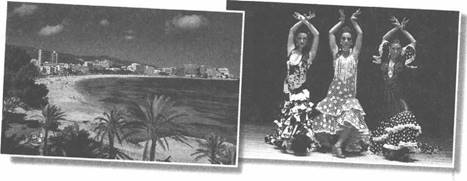
1. Tracy had her best holidays last month.
TRUE FALSE
2. Tracy thinks Spanish beaches are wonderful.
TRUE FALSE
![]() З. In Spain Tracy's mother cooked Spanish food.
З. In Spain Tracy's mother cooked Spanish food.
TRUE FALSE
4. Tracy's brother is older than she is.
TRUE FALSE
5. Tracy stayed in Spain for more than a week.
TRUE FALSE
6. Tracy took part in a dancing competition in Spain.
TRUE FALSE
qre•ane (MaKCVlMaJ1bHblÿ1 6ann — 6) 7
![]()
3AAAHb'1E
2. np0HHTaÿ1Te TeKCT VI 3aKOHHV•1Te npeanoxe- ![]() I-MR nocne Hero. 06BeAVITe 6YKBY (a,
b, c), COOTBeTCTBWO-
I-MR nocne Hero. 06BeAVITe 6YKBY (a,
b, c), COOTBeTCTBWO- ![]()
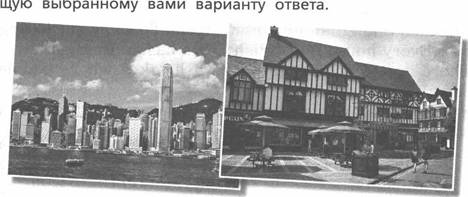 Bb16PaHHOMY Barvlb•l BapnaHTY OTBeTa.
Bb16PaHHOMY Barvlb•l BapnaHTY OTBeTa.
The company Hong Kong Housing is building a new suburb in Shanghai, a city with a population of more than 15 million people. But this suburb is not like other parts of Shanghai. It is a little piece of England. The name of the new area is English Town. The manager of Hong Kong Housing says many people in this part of China want to buy an English house and live like the English do.
This town is like any other English town, for example Bristol or Chester. There is a square in the centre. In this square there are pigeons that you can feed. Some years ago you could do that in Trafalgar Square in London.
English Town is also very proud of its long and busy shopping street. There are several shops in this street where you can buy traditional English food like fish and chips or Christmas pudding. Not far from it there are four English-style pubs and you can buy different English drinks there.
There are no cricket fields in this new English Town. Nobody in Shanghai
can play this game. But there is 8 a football stadium like those in England
because people love football. English Town even has its own football ![]() team. Also, there is a canal in the
town where you
team. Also, there is a canal in the
town where you ![]() can go boating like in Cambridge. However, not many
can go boating like in Cambridge. However, not many ![]() people do that.
people do that.
The rich Shanghai businessmen can do some gardening too. Every house in English Town has an English lawn. There are also long gardens with lakes where people can walk and relax.
But there is one problem. The houses in English Town cost a minimum of £400,000!
1. English Town is in the suburb of![]()
a) Shanghai b) London c) Hong Kong
2. Many people in Shanghai![]()
a) want to move to England
b) want to have an English lifestyle
c) have nowhere to live
3. In the centre of English Town there
is![]()
a) a square b) a lake c) a garden
4. In the pubs in English Town you can buy English
![]()
a) food b) drinks c) souvenirs
5. A lot of people in Shanghai enjoy![]()
a) playing cricket
b) going boating
c) playing football
6. You can buy a house in English Town only if you are
![]()
a) rich b) a businessman c) British
![]()
9 3AAAHb'1E 3. 3aKOHHV•1Te npeanoxeHv•1fi nonxoaqu-4L,1ML.'1 no CMblCJIY CTIOBaMV1. 06Beav•1Te rlPaBVIJ1bHblÿ1 OTBeT (a, b, C).
1. When the architects ![]() this old school, it will look like a
modern sports centre.
this old school, it will look like a
modern sports centre.
a) build b) rebuild c) building
2. Kings and queens usually live in big![]()
a) cathedrals b) monuments c) palaces
3. My friend is as![]() as my elder brother. He is not short
at all.
as my elder brother. He is not short
at all.
a) high b) tall c) big
4. It's not easy to![]() huge stone castles.
huge stone castles.
a) appear b) turn into c) defend
5. 1 ![]() live in the city where I was born.
live in the city where I was born.
a) still b) by and by c) fairly
6. My dad often![]() to the news.
to the news.
a) watches b) hears c) listens
rpararaanu«a (MaKCV•1MaJ1bHblÿ1
6ann![]()
![]()
3AAAH¼E 4. Ilp0HVITaÿ1Te ,qaHHble I-IV-IXe npeanoxeHb1B.
npe06pa3yVITe cnoBa B CK06KaX TaK, HT06bl OHM rpaMMa![]() COOTBeTCTBOBaJIV1 COAeP)KaHV110
TeKCTa. 3anor1Hv•1Te
COOTBeTCTBOBaJIV1 COAeP)KaHV110
TeKCTa. 3anor1Hv•1Te ![]() nOnyqeHHblMV1 CTIOBaMV1.
nOnyqeHHblMV1 CTIOBaMV1.
1. Michael Lomonosov (found) ![]() Moscow University.
Moscow University.
2. When I came home, I (understand) ![]() that it was very late and my parents
were already sleeping.
that it was very late and my parents
were already sleeping.
3. Nobody (know) ![]() anything about the exam now. It's
too early.
anything about the exam now. It's
too early.
10
4. My parents (build) ![]() our country house five years ago.
our country house five years ago.
![]() 5. When the head teacher entered the hall, all children
(stand)
5. When the head teacher entered the hall, all children
(stand)![]() up.
up.
6. I (write) ![]() a letter to my friend from France soon. Now I just don't have time for
it.
a letter to my friend from France soon. Now I just don't have time for
it.
Il"CbM0 (MaKCVIMaJ1bHblV1 6ann
3AAAHVIE
5. ![]() paccKa3 0 Meae, B KOTOPOM Bbl XVIBëTe. Ann 3Toro Barvl HYXHO aaTb
nom-Ibie OTBeTbl Ha BOnpocbl, rlPVIBeAëHHble HVIXe. Y Bac AOJ1>KeH
nonyqvm,cq norVIHHblÿ1 pac«a3, COCTOBU-ÅV<L¥I V13 He MeHee
qeM 6 4)pa3.
paccKa3 0 Meae, B KOTOPOM Bbl XVIBëTe. Ann 3Toro Barvl HYXHO aaTb
nom-Ibie OTBeTbl Ha BOnpocbl, rlPVIBeAëHHble HVIXe. Y Bac AOJ1>KeH
nonyqvm,cq norVIHHblÿ1 pac«a3, COCTOBU-ÅV<L¥I V13 He MeHee
qeM 6 4)pa3.
1. Where do you live?
2. Is the place where you live big or small?
3. Do you like the place where you live?
4. What do you like about the place where you live?
5. Are there any things you dislike about the place where you live?
6. What do you dislike about the place where you live?
![]()
![]()
![]()
![]()
![]()
![]()
![]()
11
![]()
![]()
![]()
![]()
![]()
3AAAHVIE 6. COCTaBbTe M0Honorv1qecKoe BblCKa3blBaHLae Ha npeanoxeHHW0 TeMY. Baw MOHOJIOr AOJ1)KeH coaepxaTb He MeHee 8 Cþpa3.
![]() Speak about a Russian city you like. This plan will help you.
Speak about a Russian city you like. This plan will help you.
• Introduction (BcTY11J1eHHe — 1 npeAJ10yceHHe)
• Main body (OCHOBHafl T.lacrrb MOHOJIOra)
— What Russian city do you like? Why/Why not?![]()
— Where in Russia is this city?![]()
— What is this city famous for?![]()
Would you like to live in this city all your life? Why/Why not?![]()
![]() • Conclusion (3aKJ1roqer-1He — I rrpeAJIŒKeHHe)
• Conclusion (3aKJ1roqer-1He — I rrpeAJIŒKeHHe)![]()
Социокультурные знания (максимальный балл
ЗАДАНИЕ 7. Соотнесите города и их достопримечательности. Впишите номера названий достопримечательностей
12 (1—8) в соответствующие строчки.
Moscow![]()
![]() St Petersburg
St Petersburg![]()
|
1. The Pushkin Museum |
5. Dvortsovaya Square |
|||
|
2. The Summer Garden |
6. kazan Cathedral |
|||
|
З. Nevsky Prospekt |
7. Spasskaya Tower |
|||
|
4. St Basil's Cathedral |
8. The Bolshoi Theatre |
|||
|
Ваш итоговый балл |
|
|
|
|
|
|
|
4 34 |
5 |
|
33—28 |
4 |
|
27—24 |
з |
|
23—0 |
2 |
|
Какие из разделов теста оказались самыми сложными? Как вы думаете, почему? |
|
В каких грамматических явлениях вы допустили ошибки? |
|
Какая лексика требует дальнейшей отработки? |
|
Что могло бы помочь вам лучше справиться с заданиями по говорению и письму? |
|
Насколько вы довольны вашими результатами? |
13
Unit 2
Visiting Britain
14 (максимальный балл — 40)
![]() Аудирование (максимальный
балл
Аудирование (максимальный
балл
ЗАДАНИЕ 1. Послушайте разговор Фионы и Тома. Определите, какие из приведённых ниже утверждений соответствуют содержанию текста (True), а какие не соответствуют (False). Обведите выбранный вариант ответа. Вы услышите запись два раза, (ф (2).
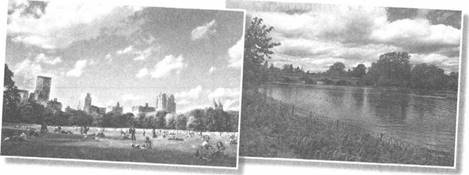
1. Yesterday Fiona bought а lot of nice things.
TRUE FALSE
2. Fiona is not tired after shopping.
TRUE FALSE
З. Fiona knows а lot about Hyde Park.
TRUE FALSE
4. There is а lake in Hyde Park.
TRUE FALSE
5. People can go horse riding in Hyde Park.
TRUE FALSE
6. Hyde Park has a well-known statue.
TRUE FALSE
qree•ue (MaKCVIMaJ1bHblVl 6ann — 6) 15
![]()
3AAAHL4E 2.
np0HL,1Taÿ1Te Tel<CT VI 3aKOH'-lVITe npeanoxeHL,1R ![]() nocne Hero.
06BeAVITe 6YKBY (a, b, c), COOTBeTCTBWOLLIYK)
nocne Hero.
06BeAVITe 6YKBY (a, b, c), COOTBeTCTBWOLLIYK) ![]() Bb16PaHHOMY Barv1V1
Bapv•1aHTY OTBeTa.
Bb16PaHHOMY Barv1V1
Bapv•1aHTY OTBeTa.
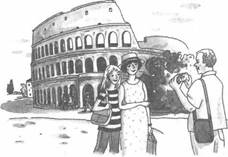
I'm Sally and I'm 12 years old. For me summer is the best season of the year. I have a lot of good friends at school. So, when summer starts I get lots of free time to spend with my friends. We go to the park, ride our bikes and always eat a lot of ice cream.
My parents love to travel abroad while they are on holiday. So we always go to some foreign country in summer. As for me, I also like seeing new places and meeting new people.
Last summer was full of good things. In June my parents and I went to Italy for a week. The weather was warm and sunny. And the nature in this country is beautiful. We swam a lot in the sea, we sunbathed, then we went on some excursions to see the historic places around the country.
I met a nice girl from France there. We became friends. Now we write letters to each other. I hope she will visit me here in Moscow next summer.
When I came back from Italy, I went to visit my grandparents. They live
in a village which is not very far 16 from Moscow. The air there is always
fresh and clean. At my grandparents' I have some good old friends, so ![]() I wasn't bored there. I spent a lot
of time outdoors. We
I wasn't bored there. I spent a lot
of time outdoors. We ![]() played basketball, hide-and-seek, and even went to pick mushrooms once.
played basketball, hide-and-seek, and even went to pick mushrooms once.
I should say that summer was great and the weather was always wonderful! It's a pity, that my favourite season ended so quickly.
1. In summer Sally prefers to spend time![]()
a) at school
b) with her friends
c) with her grandparents
2. When on holiday Sally's parents![]()
a) like to go to the park
b) prefer to live in another country
c) enjoy travelling
3. In Italy Sally didn't![]()
a) swim in the sea
b) go to see the sights
c) learn Italian
4. Sally and her friend from France![]()
a) are pen friends
b) will go to Italy together
c) spent some time in Moscow
5. Sally wasn't bored at her grandparents' because
![]()
a) she played with her friends there
b) her grandparents played with her
c) she met new friends there
6. Sally thinks that last summer![]()
a) was strange b) wasn't long c) was too hot
17
![]()
3AAAHb1E 3. 3aKOHHVITe npeanoxeHL'1B rlOAXOAR1.Ub•1ML.'1
no ![]() CMblCJIY CJ10BaMV1. 06BeAVITe rlPaBV•1J1bHblV1 OTBeT (a, b, C).
CMblCJIY CJ10BaMV1. 06BeAVITe rlPaBV•1J1bHblV1 OTBeT (a, b, C).
1. There are a lot of![]() beaches in Spain.
beaches in Spain.
a) sand b) sandy c) resort
2. ![]() our English lessons we read a lot of
interesting texts.
our English lessons we read a lot of
interesting texts.
a) On b) With c) During
3. Children enjoysandcastles on the beach.
a) to make b) making c) doing
4. Moscow and St Petersburg are big![]() centres.
centres.
a) culture b) cultured c) cultural
5. About 8![]() people live in London.
people live in London.
a) million b) millions c) millions of
6. I have friends from Moscow and I ![]() have a pen friend from France.
have a pen friend from France.
a) also b) as well as c) too
![]()
3AAAHL4E 4. np0HL.1TaVITe aaHHbte I-IVIXe npeanoxeHL,1B.
npe06pa3yÿ1Te cnoBa B CK06KaX TaK, HT06bl OHM rpaMMaTV•1qeCKV1
COOTBeTCTBOBanv•1 ![]() Tecra. 3an0JIHL.1Te
Tecra. 3an0JIHL.1Te ![]() nOnyqeHHblMV•1 CJIOBaMV1.
nOnyqeHHblMV•1 CJIOBaMV1.
1. When I came to school, my friend (wait) ![]() for me at the entrance.
for me at the entrance.
2. Last summer my parents and I (travel) ![]() to Europe two times.
to Europe two times.
18 3. What (be) ![]() the teachers like when you went to the school?
the teachers like when you went to the school?
![]() 4. "I don't know what the word
government (mean)
4. "I don't know what the word
government (mean) ![]() , " the student said to the teacher.
, " the student said to the teacher.
5. First Jeremy (lie) ![]() on the sand, then he sat and started
reading his favourite book.
on the sand, then he sat and started
reading his favourite book.
6. When my friends went to the Tower of
London, they (take)![]() a lot of pictures of ravens.
a lot of pictures of ravens.
nwcbM0 (MaKCVIMaJ1bHblÿ1 6ann
3AAAHL•'1E 5. I-Ianuu-lL-4Te paccKa3 0 CBOëM nyTeLLleCTBV•1V1. Anq 3Toro Barvl HYXHO aaTb nonHble OTBeTbl Ha Bonpocbl, rlPVIBeAëHHble HVIXe. Y Bac AOJIXeH nonyqL,1Tbcq nor-w-lHblV1 paccKa3, COCTORLAVIVI V13 He MeHee qeM 6 cþpa3.
1. When and where did you go?
2. Who did you go with?
3. How long was your trip?
4. Where did you stay?
5. What did you do during the trip?
6. Would you like to come back to this place again? Why/Why not?
![]()
![]()
![]()
![]()
![]()
![]()
19
![]()
![]()
![]()
![]()
![]()
3AAAHVIE 6. COCTaBbTe M0HonornqecKoe BblCKa3blBaHV1e Ha npeanoxeHHY}0 Terv1Y. Baw MOHOJIOr AOJ1)KeH conepxaTb He MeHee 8 cþpa3.
Speak about your summer holidays. These questions will help you.
![]()
• Introduction
• Main body
— What were your holidays like?
— Where did you go and what did you do there?
— What did you like most about your summer holidays?
![]() Were you happy to get back to school? Why/Why not?
Were you happy to get back to school? Why/Why not?![]()
• Conclusion
Социокультурные знания (максимальный балл
ЗАДАНИЕ 7. Определите, являются ли эти высказывания верными (True) или нет (False). Обведите правильный от-
20 вет.
![]() 1. The oldest part of
London is the City.
1. The oldest part of
London is the City.
TRUE FALSE
![]() 2. The Tower of London is а
cathedral.
2. The Tower of London is а
cathedral.
TRUE FALSE
З. St Paul's Cathedral is famous for its dome.
TRUE FALSE
4. The Clock Tower is called Big Веп.
TRUE FALSE
|
Ваш итоговый балл |
|
|
|
|
|
4 — 34 |
5 |
|
33—28 |
4 |
|
|
з |
|
23—0 |
2 |
|
Какие из разделов теста оказались самыми сложными? Как вы думаете, почему? |
|
В каких грамматических явлениях вы допустили ошибки? |
|
Какая лексика требует дальнейшей отработки? |
|
Что могло бы помочь вам лучше справиться с заданиями по говорению и письму? |
|
Насколько вы довольны вашими результатами? |
21
Аудирование (максимальный балл
ЗАДАНИЕ 1. Послушайте разговор Сюзан и Пола. Определите, какие из
приведённых ниже утверждений соответствуют содержанию текста (True), а какие не
соответствуют (False). Обведите выбранный вариант ответа. Вы услышите запись 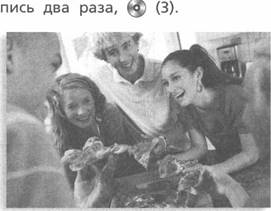 два раза, (З).
два раза, (З).
1. The party will be in Susan's house.
TRUE FALSE
2. Susan will serve pizza at the party.
TRUE FALSE
З. Susan is trying to lose some weight.
TRUE FALSE
4. Susan's neighbour won't perform at the party.
TRUE FALSE
5. Paul wants to have dance music at the party.
TRUE FALSE
6. Susan hates collecting stamps.
TRUE FALSE
23
![]()
3AAAHb•1E 2.
npoqv•1Taÿ1Te -reKCT VI 3aKOHHV4Te npeanoxeHv•1fi ![]() nocne Hero. 06BeAV4Te
6YKBY (a, b, c),
nocne Hero. 06BeAV4Te
6YKBY (a, b, c), ![]() Bb16PaHHOMY Barv1V1 BapL,1aHTY OTBeTa.
Bb16PaHHOMY Barv1V1 BapL,1aHTY OTBeTa.
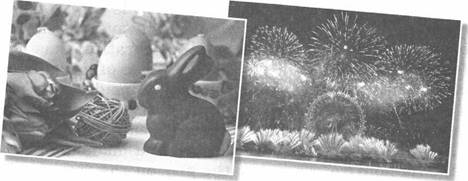
There are a lot of holidays and festivals around the world. As for British children their most favourite holidays are: New Year's Eve, Easter, Guy Fawkes' Night. New Year's Eve is on the 31st of December. In Britain people often go to parties. At midnight, they hold hands and sing the Scottish song called "Auld Lang Syne "l . Then they usually go into the street and wish their family, friends and neighbours a "Happy New Year". Some people let off fireworks to celebrate.
Another holiday that the British love a lot is Easter. It is always in spring, usually in April. There are three
![]()
1 Auld Lang Syne![]()
important
days at Easter. The name of the first day is Good Friday. On this day, many
people don't eat meat, only fish. The second important day is Easter Sunday.
Some people go to church and children get chocolate Easter eggs. Usually
families get together and have 24 a big meal of roast meat on this day. The
third important day Easter Monday, is a public holiday when ![]() schools and companies do not work.
Some people send
schools and companies do not work.
Some people send ![]() Easter cards. The shops are full of chocolate eggs. Many
Easter cards. The shops are full of chocolate eggs. Many ![]() Easter decorations are yellow and we
can see pictures of baby rabbits, lambs, chicks and daffodils.
Easter decorations are yellow and we
can see pictures of baby rabbits, lambs, chicks and daffodils.
Another holiday the British love a lot is Guy Fawkes' Night, or Bonfire Night which is always on the 5th of November. The traditional celebration was the following. Children made a large figure of a man with old clothes and then put newspapers inside. This was a guy. They sat outside shops with the guy and collected money to buy fireworks. They said 'Penny for the guy'. Then they went to a field or park and made a big fire called a bonfire. They put the guy on the fire. In the evening families often ate baked potatoes or sausages and had a party. At night they went to watch the fireworks display. Many people didn't like Bonfire Night because they thought it was not safe. Sometimes children burnt themselves on the fireworks.
1. On New Year's Eve British people![]()
a) play games b) go outside c) eat chocolate eggs
2. The first important day of Easter celebrations is
![]()
a) Monday b) Friday c) Sunday
3. On Easter Sunday British children get![]()
a) chocolate eggs b) postcards c) baby rabbits
4. On Easter Monday British people![]()
a) decorate their houses
b) wear yellow clothes
c) don't go to school and work
5. Children don't use this to make a guy![]()
a) old clothes b) newspapers c) fireworks 25
6. Some people think Bonfire Night is![]()
a) dangerous b) boring c) important
![]()
3AAAHb'1E 3. 3aKOHt-1VITe npeanoxeHnq nOAXOABU.4VIMV1 no CMblCJIY CJ10BaMV1. 06BeAVITe npaBVIJ1bHblV1 OTBeT (a, b, C).
1. It's very bad when parents often
shout![]() their children.
their children.
a) at b) on c) of
2. When people hear wonderful news, they say
![]()
a) Ouch b) wow c) Oops
3. People![]() their houses at Christmas.
their houses at Christmas.
a) wish b) treat c) decorate
4. My grandparents like a![]() life in the village.
life in the village.
a) quiet b) quite c) quit
5. My favourite![]() food is cakes.
food is cakes.
a) celebration b) greeting c) party
6. "It sounds unreal. I can't ![]() it is true!" Simon said.
it is true!" Simon said.
a) trust b) believe c) decide
![]()
3AAAH14E 4. np0HL.1TaÿlTe aaHHble HVIXe npeanoxeHL,1R. npe06pa3yVITe cnoBa B CK06KaX TaK, YT06bl OHM rpaMMaTh i-lecKV1 COOTBeTCTBOBaJIV1 coaepxaHV1}0 Tecra. 3ar10Jlt-tv•1Te nponyc-KL'1 nonyqel-lHblrv1þ1 CJ10BaMV1.
26 1. The book which I (read)![]() now is very interesting.
now is very interesting.
![]() 2. These (be)
2. These (be) ![]() the books which I want to read.
the books which I want to read.
3. When the clock (strike) ![]() ten, I stopped drawing. I felt
tired.
ten, I stopped drawing. I felt
tired.
4. My mother often asks me (buy) ![]() some bread on the way home from
school.
some bread on the way home from
school.
5. When I came home, I hung my coat in
the hall and (go)![]() to the kitchen.
to the kitchen.
6. Sometimes money (bring) ![]() people happiness.
people happiness.
nnCbMO (MaKCVIMaJ1bHblÿ1 6ann
3AAAHb•1E 5. Hanm.uvn-e paccKa3 0 npa3AH0BaHnv•1 H0Boro roaa B Poccnv•l. Anq 3Toro Barsa HYXHO aaTb nom-Ibie OTBeTbl Ha Bonpocbl, rlPVIBeAëHHble HV•1Xe. Y Bac AOJ1>KeH nonyqv•1Tbcq nornqHblÿ1 paccKa3, COCTOBLUV•1ÿ1 913 He Mel-lee qeM 6 cþpa3.
1. When do people celebrate New Year's Eve?
2. Who do people usually celebrate New Year's Eve with?
3. What food do people cook on New Year's Eve?
4. What do people give their friends and family?
5. What do people wish their friends and family?
6. Do you like New Year? Why/Why not?
![]()
![]()
![]()
![]()
27
![]()
![]()
![]()
![]()
![]()
rosope•wqe (MaKCVIMaJ1bHblÿ1 6ann
3AAAHL4E 6. COCTaBbTe M0HonornqecKoe BblClG3blBaHV1e Ha rlPeAJIOXeHHWO Tetv1Y. Baw MOHOJIOr AOJ1)KeH COAepxaTb He MeHee 8 cÞpa3.
Speak about your birthday. The questions will help you.
• Introduction
• Main body
— When is your birthday?
— Where and how do you celebrate your birthday?
— Who do you invite to your birthday party?
— What is your favourite birthday food?
— What presents do you usually get for your birthday?
• Conclusion
ЗАДАНИЕ 7. Дайте краткие ответы на вопросы об анГЛИЙСКИХ праздниках.
28 1. When is New Year's Eve? —![]()
![]() 2. What holiday do the British
celebrate оп the 31st 0ctober? —
2. What holiday do the British
celebrate оп the 31st 0ctober? —![]()
З. When do British people celebrate Christmas? ![]()
![]()
4. Who do British children write letters to before
Christmas? —![]()
|
Ваш итоговый балл |
|
Перевод баллов в отметки
|
|
|
|
|
|
5 |
|
|
33—28 |
4 |
|
|
2 7 24 |
3 |
|
|
23—0 |
2 |
|
|
Какие из разделов теста оказались самыми сложными? Как вы думаете, почему? |
|
В каких грамматических явлениях вы допустили ошибки? |
|
Какая лексика требует дальнейшей отработки? |
|
Что могло бы помочь вам лучше справиться с заданиями по говорению и письму? |
|
Насколько вы довольны вашими результатами? |
29
3AAAHL4E 1. nocr1Y1.uaÿ1Te pa3roBop CaHAPbl VI MapTVIHa. OnpeaeJIL,1Te, KaKV1e V13 nPL,1BeAëHHblX HVIXe YTBepxaeHL,1V1 COOTBeTCTBY}OT COAePXaHVIK) TeKCTa (True), a KaKL.1e He COOTBeTCTBY}OT (False). 06Beav•1Te Bb16PaHHblÿ1 BapuaHT OTBeTa.
Bbl YCJ1blUJVITe 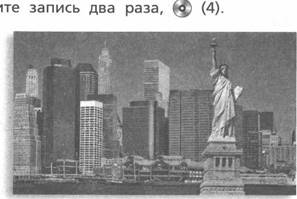 3anvtcb ABa pa3a,
3anvtcb ABa pa3a,
1. Sandra is learning English in New York.
TRUE FALSE
2. Sandra has already done a lot of sightseeing.
TRUE FALSE
3. Sandra would like to see the Statue of Liberty.
TRUE FALSE
4. Sandra doesn't want to walk the stairs to the top of Lady Liberty.
TRUE FALSE
5. Sandra would like to have lunch in Fifth Avenue.
TRUE FALSE
6. On Saturdays Metropolitan Museum is open till
5:30 p.m.
TRUE FALSE
31
![]()
3AAAHVIE
2. npoqv1Taÿ1Te TeKCT VI 3aKOH'-lL,1Te npeanoxeHv•1R ![]() nocne Hero. 06BeAVITe 6YKBY (a, b, c),
COOTBeTCTBYiOU4y.00 Bbl6paHH0MY BaMV1 BapnaHTY OTBeTa.
nocne Hero. 06BeAVITe 6YKBY (a, b, c),
COOTBeTCTBYiOU4y.00 Bbl6paHH0MY BaMV1 BapnaHTY OTBeTa.
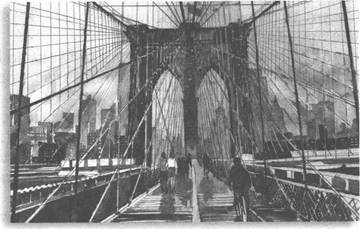
It was a beautiful sunny summer day in New York City. It was a perfect day for walking and John decided to take a walk across Brooklyn Bridge.
There were a lot of people on the bridge. They were walking, riding their bikes and eating ice cream. There were also a lot of tourists there. They were taking pictures. A woman asked John to take a picture of her and her son. He took their picture. They thanked him and John continued his walk.
A nice warm wind made John's walk pleasant. Soon he saw an old man who was sitting on a bench and drawing a picture. Next to the man there were about 30 drawings. There were drawings of bridges and buildings of New York. There were drawings of people's faces.
32 All of them were black and white. John thought they were beautiful. He
couldn't believe the price. They ![]() were only £10 each.
were only £10 each.
"These drawings are so beautiful, " John told the man.
"Thank you," the old man said. "I'm from Russia. My English is not very good. "
John said, "But your art is very good." "Sit down," the man said.
"Do you want to draw me?" John asked.
"Yes," the man answered.
Unfortunately John didn't have time for that so he just bought a beautiful picture of New York skyscrapers and waved goodbye to the old man.
He continued walking. Soon he stopped to look at the Statue of Liberty. It was far and looked so small. There were many ships and boats on the East River. Some boats were full of tourists. They were going to the Statue of Liberty.
John crossed the bridge and continued his walk in Brooklyn Bridge Park. There he decided to have lunch. There were a lot of street vendors in the park selling food and drinks and also T-shirts, postcards and CDs. John had a hotdog, a coke and an ice cream.
What a pleasant time he was having in New York! What a pleasant time all people around him were having!
1. John decided to take a walk because![]()
a) the weather was good
b) he had some free time
c) he loved bridges
2. On Brooklyn Bridge there were a lot
of![]()
a) bicycles b) tourists c) pictures
3. On the old man's drawings you could
not see![]()
a) buildings b) bridges c) many colours
4. The old man wanted to![]() 33
33
a) talk to John
b) draw John's portrait
c) sell John a picture
5. The boats took tourists to![]()
a) the Statue of Liberty
b) the other bank of the East River
c) Brooklyn Bridge Park
6. The word vendor means![]()
a) a painter who draws in the street
b) a person who sells things in the street
c) a tourist who takes pictures in the street
![]()
3AAAHVIE
3. 3aKOHHVITe npeanoxeHL,1B ![]() no CMblCny CJ10BaMv•1. 06BeAL,1Te rlPaBVIJ1bHblÿl OTBeT (a, b, C).
no CMblCny CJ10BaMv•1. 06BeAL,1Te rlPaBVIJ1bHblÿl OTBeT (a, b, C).
1. How many continents are there on our![]()
a) land b) ground c) planet![]()
2. When we arrive![]() Spain, we will go sightseeing as soon
as possible.
Spain, we will go sightseeing as soon
as possible.
a) to b) at c) in
3. The little girl was looking at the
rain ![]() the kitchen window.
the kitchen window.
a) through b) at c) out
4. All people want to be happy and ![]() for the better.
for the better.
a) remember b) hope c) hunt
5. It's my dream to have a house on the![]() of the Black Sea.
of the Black Sea.
34 a) shore b) bank c) space
![]() 6. I won't be able to come to your birthday party
6. I won't be able to come to your birthday party ![]() I get ready for my exam.
I get ready for my exam.
a) as soon as b) before c) after
![]()
3AAAHL'1E 4. np0WITaVITe npeanoxeHÞIB. npe06pa3yVITe cnoBa, AaHHble B CK06KaX, TaK, HT06bl OHV•I rpaMMaTnqecKL,1 COOTBeTCTBOBaJIV1 COAepxaHVIK) TeKCTa. 3an0JIHv•1Te nponycKL'1 nonyqeHHblMv•1 CJIOBaMV1.
1. Do you think we (have) ![]() a test tomorrow? — I'm not sure.
a test tomorrow? — I'm not sure.
2. When the teacher (come) ![]() , the lesson will start.
, the lesson will start.
3. Until holidays begin, we (not go) ![]() to the sea.
to the sea.
4. My family and I (move)![]() to another city next month. My
parents decided it long ago.
to another city next month. My
parents decided it long ago.
5. It was my birthday yesterday and my
friends (bring) ![]() me a cake and a lot of roses. I was very happy.
me a cake and a lot of roses. I was very happy.
6. The sailor said it was the
(difficult) ![]() voyage in his life.
voyage in his life.
nuCbMO (MaKCVIMaJ1bHblV1 6ann
![]() 5. Hanuwv•1Te He60nbwoe cot-MI-lei-Ine 06 AMepVIKe. Anq 3Toro BaM HYXHO
aaTb nonHble OTBeTb1 Ha BOnpocbl, rlPVIBeAëHHble HV•1Xe. Y Bac aonxeH
nonyqv•1Tbcq nornqHblV1 paccKa3, COCTORLUV•IVI V13 He MeHee yetvl 6
cþpa3.
5. Hanuwv•1Te He60nbwoe cot-MI-lei-Ine 06 AMepVIKe. Anq 3Toro BaM HYXHO
aaTb nonHble OTBeTb1 Ha BOnpocbl, rlPVIBeAëHHble HV•1Xe. Y Bac aonxeH
nonyqv•1Tbcq nornqHblV1 paccKa3, COCTORLUV•IVI V13 He MeHee yetvl 6
cþpa3.
35
1. What is the full official name of the country that people call America?
2. How many states are there in the USA?
3. What is the capital city of the USA?
4. What are the highest mountains in the USA?
5. What is the longest river in the USA?
6. Would you like to visit the USA? Why/Why not?
![]()
![]()
![]()
![]()
![]()
![]()
![]()
![]()
![]()
![]()
![]()
![]()
![]()
![]()
Говорение (максимальный балл
ЗАДАНИЕ 6. Составьте монологическое высказывание на предложенную тему. Ваш монолог должен содержать не менее 8 фраз.
36
Speak about the USA. 7'he questions will help уои.
• Introduction
• Main body
— Who discovered America? How did it happen?
— What do уои know about the geography of the USA? — Who were the native Americans?
— What is the largest city in the USA? What do уои know about it?
• Conclusion
Социокультурные знания (максимальный балл
Задание 7. Соотнесите слова в двух колонках.
1. North America
2. New York City
З. Broadway
4. Texas
5. Washington, D.C.
6. Thanksgiving
1. 2. з.
![]()
а) the US capital
Ь) а street
с) а continent
d) а holiday
f) the US biggest city
|
Ваш итоговый балл |
|
4. 5. 6. ![]()
|
|
|
|
40—34 |
5 |
|
33—28 |
4 |
|
27 24 |
з |
|
23—0 |
2 |
37
|
Какие из разделов теста оказались самыми сложными? Как вы думаете, почему? |
|
В каких грамматических явлениях вы допустили ошибки? |
|
Какая лексика требует дальнейшей отработки? |
Окончание таблицы
|
Что могло бы помочь вам лучше справиться с заданиями по говорению и письму? |
|
Насколько вы довольны вашими результатами? |
38
Аудирование (максимальный балл
ЗАДАНИЕ 1. Послушайте разговор Адама и Бренды. Определите, какие из
приведённых ниже утверждений соответствуют содержанию текста (True), а какие не
соответствуют (False). Обведите выбранный вариант ответа. Вы услышите запись 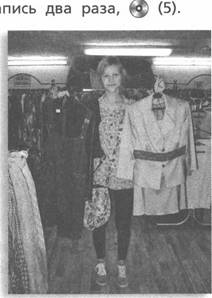 два раза, (5).
два раза, (5).
1. Brenda and Adam are classmates.
TRUE FALSE
2. Brenda doesn't like shopping.
TRUE FALSE
3. Brenda's parents often buy food.
TRUE FALSE
4. Brenda can easily get to the mall any time she wants.
TRUE FALSE
5. Brenda's parents buy her all the clothes she wants in the mall.
TRUE FALSE
6. Brenda gave her mother a fashionable sweater last month.
TRUE FALSE
|
grel•awe |
(MaKCVIMaJ1bHblÿ1 6ann |
3AAAHL'1E 2. npoqv•1Taÿ1Te TeKCT VI 3aKOHqVITe
npeAnoxeHL.'1B nocne Hero. 06BeA"1Te 6YKBY (a, b, c), ![]() Bb16PaHHOMY BaMV1 Bapv•1aHTY OTBeTa.
Bb16PaHHOMY BaMV1 Bapv•1aHTY OTBeTa.
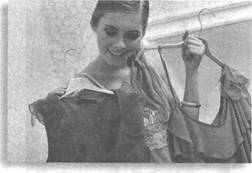
The dance starts in thirty minutes, but Wendy isn't ready yet. She is still in her bedroom. She is looking at her new dress hanging on the wall.
Her new dress is black with lovely roses on it. It is very elegant and Wendy looks beautiful in it. When Wendy wears it, it seems to her she is a film star.
Still, Wendy isn't sure if she wants to wear the black dress to the dance. That's because she didn't buy it. She made it herself. Wendy loves to design and make her own clothes. She wants to be a clothes designer when she grows up. But at the moment she is uncomfortable. She doesn't want to be the only girl at the dance wearing a homemade dress.
Wendy opens her wardrobe. She takes out a big box 41 and looks into it.
In it there is the dress her mother bought her for the dance. It is white. It
is pretty, but ![]() not as elegant as the black dress. She hangs the white
not as elegant as the black dress. She hangs the white ![]() dress on the wall next to the black
one and steps back.
dress on the wall next to the black
one and steps back.
She looks at both of the dresses and doesn't know what to do. After a while she decides that she likes the white dress, but she loves the black one.
"What will my classmates think if they find out that my dress is homemade?" she thinks. Wendy feels very nervous. Finally she takes the white dress and stands holding it in front of the mirror.
All of a sudden she throws the white dress on the bed.
Wendy decides to risk it. She puts the black dress on. She takes one more look at the mirror and heads to the door.
Wendy arrives at the dance and her friend Susan meets her there. She is also wearing a dress. It is red with grey flowers on it.
"You look great," Susan says to Wendy.
"Thanks," Wendy says. "You do too!"
1. Wendy is getting ready for![]()
a) school
b) a dance
c) a fashion show
2. In her new dress Wendy feels like a![]()
a) designer
b) famous actress
c) schoolgirl
3. Wendy is uncomfortable because her black dress is
![]()
a) too fashionable
b) not elegant
c) handmade
42 4. Wendy's mother bought
her![]()
a) a white dress
b) a black dress
c) a dress with roses on it
5. Wendy likes the black dress![]()
a) as much as the white one
b) less than the white one
c) more than the white one
6. Susan thinks that Wendy's dress is![]()
a) very nice
b) cheap
c) fashionable
![]()
3AAAHVIE
3. 3aKOHHVITe npeanoxeHv•1B ![]() no CMblcny CJIOBaM¼. 06BeAVITe npaB¼J1bHblV1 OTBeT (a, b,
C).
no CMblcny CJIOBaM¼. 06BeAVITe npaB¼J1bHblV1 OTBeT (a, b,
C).
2. I enjoy downhill and cross-country![]()
a) ski b) skis c) skiing
3. It's getting cold and frosty, the
temperature is 10 degrees![]() zero already.
zero already.
a) above b) below c) under
4. All our students ![]() neat and tidy clothes at school.
neat and tidy clothes at school.
a) wear b) dress c) put on
4. I hope our team will ![]() the next football match. We want to
be in the finals.
the next football match. We want to
be in the finals.
a) meet b) forget c) win
5. People usually don't sleep in![]()
a) pyjamas b) slippers c) nighties
43
6. I'm leaving![]() Barcelona in two days.
Barcelona in two days.
a) to b) for c) in
![]()
3AAAHL4E 4. npoqL.'1TaVITe npeanoxeHL.•1fi. npe06pa3yÿ1Te CJ10Ba B
CK06KaX -raK, HT06bl OHM rpaMMaTV1qeCKV1 COOTBeTCTBOBar1V1 ![]() Tel<CTa. 3anom-lMTe nponycKL.•1
nonyqeHHblML,1 CTIOBaMV1.
Tel<CTa. 3anom-lMTe nponycKL.•1
nonyqeHHblML,1 CTIOBaMV1.
1.
Tom's clothes
(be) ![]() scruffy and dirty when he came home from the playground.
scruffy and dirty when he came home from the playground.
2.
My friend (leave)
![]() for Berlin in a week. He has already bought the tickets.
for Berlin in a week. He has already bought the tickets.
3. Look, what a beautiful shirt! I think I (buy)
![]() it.
it.
— You should! It's very nice!
4.
— The next train
(arrive) ![]() only at 5:30. Let's have coffee together.
only at 5:30. Let's have coffee together. ![]() Sounds good to me!
Sounds good to me!
5.
If my friend (not
come) ![]() soon, we'll start the concert without him.
soon, we'll start the concert without him.
6.
I don't know when
the class (begin) ![]() tomorrow. You should ask the teacher.
tomorrow. You should ask the teacher.
nncbM0 (MaKCV1%J1bHblV1 6ann
3AAAHVIE 5. Harlþ1LIJL.1Te paccKa3 0 3V•1Me. Ann 3Toro Barvl HYXHO aaTb nom-Ibie OTBeTbl Ha BonPOCbl, rlPL'1BeAëHHble
HVIXe. Y
Bac AOnxeH nonyqv.1Tbcq JlOrVIHHblV1 paccKa3, COCTOR![]() 143 He MeHee qervl 6 (þpa3.
143 He MeHee qervl 6 (þpa3.
1. What's the weather like in Russia in winter? ![]() 2. Do you enjoy such weather?
2. Do you enjoy such weather?
![]() 3. Do you spend much time
outdoors in winter?
3. Do you spend much time
outdoors in winter?
![]()
4. What winter sports do you do?
5. What clothes do you wear in winter?
6. What is your favourite winter month? Why?
![]()
![]()
![]()
![]()
![]()
![]()
![]()
![]()
![]()
![]()
![]()
![]()
![]()
![]()
roBopeHne (Mal<CVIMaJ1bHblÿ1 6ann
3AAAHVIE 6. COCTaBbTe M0HonorL'1qecKoe BblCKa3blBaHV1e ![]() npeanoxeHHYK) Terv1Y. Baw M0Honor
AOJ1)KeH COAepxaTb
npeanoxeHHYK) Terv1Y. Baw M0Honor
AOJ1)KeH COAepxaTb ![]() Mel-lee 8 cþpa3.
Mel-lee 8 cþpa3.
45
 clothes do you enjoy wearing? Why?
clothes do you enjoy wearing? Why?
![]() — Are your clothes usually neat or scruffy? Why?
— Are your clothes usually neat or scruffy? Why?![]()
![]() — Where do you usually buy clothes? Why?
— Where do you usually buy clothes? Why?
![]() — Is it important for you to look fashionable? Why/
— Is it important for you to look fashionable? Why/ ![]() Why not?
Why not?
![]() • Conclusion
• Conclusion
 7. Aori0JIHL,1Te npeanoxeHL,1B
7. Aori0JIHL,1Te npeanoxeHL,1B
KM. TPVI cnoBa BBJIBK)Tcq JIV•IUJHVIMVI.
|
Harrods, Regent, London, Scotland Yard, Celsius, Fahrenheit, the Louvre |
1. In Britain the temperature is measured in
![]()
2. Most of London's fashionable shops
are in ![]() and Oxford Streets.
and Oxford Streets.
З. Мапу people think that in this
shop уои сап buy everything. It is![]()
4.![]() is а place where English detectives work.
is а place where English detectives work.
46
|
Ваш итоговый балл |
|
Перевод баллов в отметки
|
|
|
|
40—34 |
5 |
|
33—28 |
4 |
|
27 24 |
з |
|
23—0 |
2 |
|
Какие из разделов теста оказались самыми сложными? Как вы думаете, почему? |
|
В каких грамматических явлениях вы допустили ошибки? |
Окончание таблицы
|
Какая лексика требует дальнейшей отработки? |
|
Что могло бы помочь вам лучше справиться с заданиями по говорению и письму? |
|
Насколько вы довольны вашими результатами? |
47
ЗАДАНИЕ 1. Послушайте разговор Стивена и Джейн. Определите, какие из приведённых ниже утверждений соответствуют содержанию текста (True), а какие не соответствуют (False). Обведите выбранный вариант ответа. Вы услышите запись два раза, (б).
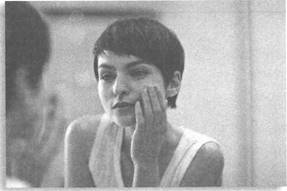
1. Steven needs to write ап article for his ехат.
TRUE FALSE
2. Most girls in Jane's school prefer short hair.
TRUE FALSE
З. Boys in Jane's class епјоу basketball.
TRUE FALSE
4. Jeans and T-shirts are Jane's favourite clothes.
TRUE FALSE
5. The pretty girl from Jane's class has a lot of friends.
TRUE FALSE
6. For Jane it is more important to be a good person 49 than to be pretty.
TRUE FALSE
qreHwe (MaKCVIMaJ1bHblV1 6ann
3AAAHb•1E 2. np0WITaÿ1Te Tel<CT VI 3aK0Hqn-re
npeanoxeHv•1q nocne Hero. 06BeAVITe 6YKBY (a, b, c), ![]() Bbl6PaHHOMY BaMV1 BapuaHTY OTBeTa.
Bbl6PaHHOMY BaMV1 BapuaHTY OTBeTa.
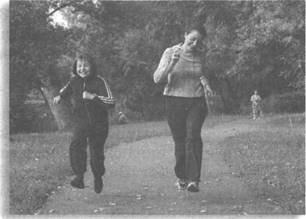
David, a twelve-year-old boy and his mother, Linda like running. Sometimes David and Linda run together and they really enjoy it but for different reasons.
David is very good at running. He is very fast. In his school there are a lot of running competitions. David usually wins them. He is the best runner in his school. One day a new student came to David's class. Everyone
thought he was a very fast runner. But in the race David still came first and beat him.
Running makes David happy because he is fairly good at this sport. When he wins a running competion, he feels very proud.
50 His mother enjoys running too. But she likes running because it is
good for her health. It makes her heart ![]() strong and makes her feel well.
strong and makes her feel well.
![]() David likes to sprint. He likes to run very fast. He thinks it's very
exciting. He is good at starting at the right moment just when the starter
says: "On your marks, get set, go!"
David likes to sprint. He likes to run very fast. He thinks it's very
exciting. He is good at starting at the right moment just when the starter
says: "On your marks, get set, go!"
Linda enjoys running long distances. She doesn't try to run fast. She tries to run far. She usually runs more than 1 kilometer. Sometimes she runs 4 or 5 kilometers. She enjoys running slowly.
One Saturday the school held a race. It was a 3 km race. Students and parents were both invited to run. David really wanted to run with his mother. He boasted he would beat her, but Linda just smiled.
So they went to race. The starter yelled: "On your marks, get set, go!" David was ready, the race began. David started running fast. He ran the first kilometer. He looked back to see his mother. She was far behind. During the second kilometer David slowed down. His mother was catching up! "Come on!" she smiled when she was passing by. David tried to run very fast but he couldn't catch up with her. Soon Linda crossed the finish line. She looked back to see David. He was running very slowly. "You can do it!" she shouted. David heard her and smiled. Finally he crossed the finish line.
"Not too bad, for an old lady!" Linda said.
"Hey, mum! Will you teach me to run like you?" David answered.
Linda smiled at her son and said: "Of course!"
1. David sometimes runs with his![]()
a) classmate
b) best friend
c) parent
2. David's new classmate ran![]()
a) faster than David 51
b) slower than David
c) as fast as David
3. Linda likes running because![]()
a) it is healthy
b) she likes competitions
c) she wants to win a race
4. Linda doesn't like running![]()
a) fast b) slowly c) far
5. The school race was![]()
a) 5 km b) 4 km c) 3 km
6. David crossed the finish line![]()
a) before his mother
b) after his mother
c) together with his mother
![]()
3AAAHL4E 3. 3aKOHqVITe npeanoxeHb1R rlOAXOA9LUVIMV1 no CMblCJIY CJIOBaML,1. 06BeAVITe npaBL•1J1bHblÿ1 OTBeT (a, b, C).
1. Ballerinas can stand on their![]() for hours.
for hours.
a) fingers b) toes c) socks
2. When I saw Alice, she had a small elegant bag in her
![]()
a) hands b) arms c) fingers
3. People who do sports are usually![]()
a) stout b) weak c) fit
4. Amanda, my best friend, is very![]() . She always helps me in different
situations.
. She always helps me in different
situations.
a) selfish b) reliable c) greedy
52 5. The little girl looks very cute and funny because she
has a small![]() nose.
nose.
a) curly b) turned up c) good-looking
6. You can't describe people's faces as![]()
a) round b) oval c) thick
![]()
3AAAHVIE 4. npoqv•1TaVITe npeanoxeHv•1B. npe06pa3yVITe cnoBa B CK06KaX TaK, HT06bl OHM rpaMrv1aTv•1qeCKV1 COOTBeTCTBOBanV1 coaepxawuo TeKCTa. 3anoJ11-MTe nponycKL,1 nonyqeHHblMV1 CT10BaMV1.
1. Yesterday I (be) ![]() able to visit my grandparents
because I didn't have much homework.
able to visit my grandparents
because I didn't have much homework.
2. My younger sister is lucky because
she (not have) ![]() to go to school on Saturdays.
to go to school on Saturdays.
3. When Ben (be) ![]() six, he could read faster than his
classmates.
six, he could read faster than his
classmates.
4. I like it that my hair (be)![]() curly and thick.
curly and thick.
5. My elder brother (look) ![]() like our father. They are both very
good-looking men.
like our father. They are both very
good-looking men.
6. I hope in the future I will learn to
play tennis. I (get) ![]() better every day.
better every day.
Письмо (максимальный балл
ЗАДАНИЕ 5. Опишите вашего друга. Для этого нужно дать полные ответы на вопросы, приведённые ниже. У вас должно получиться логичное описание, состоящее из не менее чем 6 фраз.
53
1. What's your friend's пате? 2. How old is he/she?
З. What does he/she look like?
4. What clothes does he/she usually wear?
5. What is he/she like?
6. What does he/she do in his/her free time?
![]()
![]()
![]()
![]()
![]()
![]()
![]()
![]()
![]()
![]()
![]()
![]()
![]()
![]()
Говорение (максимальный балл
ЗАДАНИЕ б. Составьте монологическое высказывание на предложенную тему. Ваш монолог должен содержать не менее 8 фраз.
54
• What do уои look like? (Try to give as тапу details as possible.)
• What are уои like? Why do уои think so?
![]() • What do уои do in your free time?
• What do уои do in your free time?
Социокультурные знания (максимальный балл
ЗАДАНИЕ 7. Напишите четыре прилагательных на англиЙском языке, которые, на ваш взгляд, лучше определяют русский и английский характер.
Russian character British character
1. ![]() 1.
1.
![]()
2.
![]() 2.
2.![]()
з. ![]() з.
з. ![]() 4.
4.![]() 4.
4.![]()
|
Ваш итоговый балл |
|
|
|
|
|
4 о 34 |
5 |
|
33—28 |
4 |
|
27—24 |
з |
|
23—0 |
2 |
55
|
Какие из разделов теста оказались самыми сложными? Как вы думаете, почему? |
|
В каких грамматических явлениях вы допустили ошибки? |
|
Какая лексика требует дальнейшей отработки? |
|
Что могло бы помочь вам лучше справиться с заданиями по говорению и письму? |
|
Насколько вы довольны вашими результатами? |
56 •recT 1
![]()
![]() 3Anucb 1
3Anucb 1
Kevin: So, talking about holidays. Are there any ![]() really, really good holidays that
you remember, Tracy?
really, really good holidays that
you remember, Tracy?
Tracy:
Well, I think one of my most favourite holidays ![]() were when I went to Spain with my family. It was two
were when I went to Spain with my family. It was two ![]() years ago.
years ago.
Kevin: Wow, Spain, I've never been there. But I'd love ![]() to!
to!
o Tracy: Oh, Spain is
a wonderful country. The ![]() architecture is great and the beaches are so good and s beautiful.
I loved them.
architecture is great and the beaches are so good and s beautiful.
I loved them.
Kevin: So what did you do in Spain?
Tracy: Mainly I just relaxed in the swimming pool and on the beach. And in the evenings I went shopping with my mum. We often went to cafés and had some really nice traditional Spanish food too. My mum was very happy that she didn't have to cook.
Kevin: Oh, that sounds really interesting, like there perfect holidays. So you said you went with your family, right?
Tracy: Yes, I went with my mum and dad and my younger brother.
Kevin: And for how long did you go there?
Tracy: For ten days.
Kevin: That's quite a long time!
Tracy: And when we were in Spain, there was a big dancing competition in the city where we lived. And so everybody was happy and excited. I enjoyed watching how beautifully the dancers moved because I'm a very bad dancer myself. And at night times there was live music in the streets and everybody started dancing for pleasure.
Kevin: Great! It sounds really cool, like very nice holidays. 57 Tracy: Yes, the holidays were wonderful!
Tom: So, what are you going to do today?
Fiona: Actually, I have no idea. Yesterday I did shopping in Oxford
Street. I bought very good clothes, some wonderful books and also beautiful
souvenirs for o my family! Shopping was a lot of fun, but I got really ![]() tired. I would prefer something
relaxing for today.
tired. I would prefer something
relaxing for today.
Tom: Why not visit Hyde Park then? It's one of the ![]() most beautiful places in London. If
you feel tired, a day in the open air will do you a lot of good.
most beautiful places in London. If
you feel tired, a day in the open air will do you a lot of good.
Fiona: Sounds great. I'm tired of crowded places. I think I heard the name Hyde Park, but I don't know anything about it... Is it a famous place?
Tom: Sure! London's Hyde Park is one of the greatest city parks in the world. It has over 4,000 trees, a large lake and wonderful flower gardens! There's a good chance you'll forget that you are right in the centre of London.
Fiona: That's just what I need now! What are we going to do in Hyde Park?
Tom: Well, Hyde Park has something for everyone. You can enjoy swimming, boating, cycling. There are tennis courts and even tracks for horse riding there. Fiona: Does the park have any sights?
Tom: Hyde Park is home to a number of fascinating buildings and monuments, such as the Serpentine Bridge, the Joy of Life fountain and the famous Archiles statue. And with so many open air concerts and other events there's always something to see and
58 do.
Fiona: I'm so excited! Let's have breakfast and go to Hyde Park!
Tom: Let's go!
3AnVICb 3
Susan: I'm really excited about the party this weekend!
Paul: Yeah, me too!
Susan: I want everything to be perfect. It will be fun to have friends over to my house.
Paul: Of course. We just have to make sure we have the things we need. Every party needs food, music and some fun things to do. As long as we have all those, the party will be great!
Susan: Don't worry. I have all that!
Paul: Great! I can 't wait to eat your famous cheese and tomato pizza! It's so tasty!
Susan: Oh! But I'm not going to cook it this time! I have decided to try something new!
Paul: What are you going to cook?
Susan: I want something healthy. Vegetable sandwiches and meatballs.
Paul: That doesn't sound very tasty.
Susan: But it's healthy and I'm on a diet. I want to lose a few kilos.
Paul: Ok then. Actually if we have good dance music, nobody will care about what they eat.
Susan: Oh, I wanted to tell you! We are not going to listen to dance music.
|
Susan: I have invited a 10-year-old neighbour. He'll be playing for us. He has been practising a lot lately. And he is quite good. Paul: I don't like this idea. I would prefer to have energetic dance music. But, you choose. Anyway, if we play a fun party game, everyone will still have a good time. Susan: No, Paul. Party games are so boring. I have a better idea. You know my hobby is collecting stamps. |
59
|
|
I have a big collection. And I'm going to show it to everyone. Paul: Are you serious? |
o |
Paul: What? How are we going to have a party without dance music? What are we going to listen to?
Susan: Yeah! I have three new stamps and want my ![]() friends to see them.
friends to see them.
Paul: Susan, this doesn't sound like a good party! Nobody will enjoy it!
Susan: They will. Let's try and see!
![]()
3Anncb 4
Martin: Sandra, hi! How are you doing?
Sandra: Hi! I'm fine, thanks.
Martin: Do you like it here in New York? How is your language school?
Sandra: The city is great and the language school is wonderful. The teachers are very good and my English is getting better.
Martin: Great! It was a good decision to come to New York and learn English here! You can also have a lot of practice in everyday life. So, have you got any plans for tomorrow yet?
Sandra: Not yet. But I would like to see New York.
60 I have been here for two weeks already but I haven't done any sightseeing yet. Too much homework!
Martin: Oh, I see. Where would you like to go?
Sandra: Well, first I would like to go to Liberty Island ![]() and see the famous Statue of
Liberty.
and see the famous Statue of
Liberty.
Martin: Yeah, Lady Liberty is a
popular attraction. ![]() If you are in the mood, you can walk up the stairs to
If you are in the mood, you can walk up the stairs to ![]() the crown of the Statue of Liberty.
It is hard work but
the crown of the Statue of Liberty.
It is hard work but ![]() you'll be able to enjoy a wonderful view of New York o City.
you'll be able to enjoy a wonderful view of New York o City.
Sandra: I'll definitely do that. It will be a good ![]() morning exercise. Then I want to go
to the Empire State Building.
morning exercise. Then I want to go
to the Empire State Building.
Martin: Yeah, it's in the very heart of Manhattan, near Broadway and Fifth Avenue.
Sandra: I think in the afternoon I will walk along Fifth Avenue and have lunch in one of the cafés there. Because at around 4 1 want to go to the Metropolitan Museum.
Martin: Oh, it may be a bit late. I think the museum closes at 5:30.
Sandra: Not tomorrow. Two days a week on Fridays and Saturdays it's open till 9 p.m.
Martin: I see you 've planned everything.
Sandra: Almost.
Martin: Ok then. Have a wonderful day tomorrow and
I'll give you a call next week. Bye! Sandra: See you later.
Tect 5
![]()
3Anb•1Cb 5
Adam: Hi, my name is Adam and I am a reporter of our school newspaper. Now I'm interviewing my classmate Brenda about shopping. Hi, Brenda! 61 Brenda: Hi, Adam!
Adam: And my first question. Do you enjoy shopping, ![]() Brenda?
Brenda?
Brenda: I do. I love shopping. It's one of my favourite pastimes.
Adam: And how often do you go shopping?
Brenda: It depends. I buy bread and some other food ![]() for my family almost every day on the
way home
for my family almost every day on the
way home ![]() from school. It's because my parents come back home
from school. It's because my parents come back home ![]() from work late and they don't have
time to go to the
from work late and they don't have
time to go to the ![]() supermarket.
supermarket.
Adam: And what about clothes? How often do you ![]() shop for them?
shop for them?
Brenda: Not very often. Unfortunately. Usually I buy clothes in big malls and I can't get there myself. So I need to ask my parents to drive me.
Adam: Oh, I see.
Brenda: And as I said my parents are very busy people, so I'm lucky if they take me to the mall, once a month.
Adam: I see.
Brenda: But when we go to the mall, it's a big shopping day. My parents usually buy me everything I ask for. I just show them the clothes I like and they buy all of them. And when we finish, we usually have lunch in some café and go to the cinema to see some new film.
Adam: Sounds great! And one last question. Do you prefer buying things for yourself or for other people?
Brenda: Of course, I prefer buying things for myself. I think everyone does. But, for example, last month, I had to buy a birthday present for my best friend. I tried really hard to find something nice. It took me about three hours.
62 Adam: What did you buy?
Brenda: I bought a very beautiful and fashionable sweater. And I'm so happy every time my friend wears it.
Adam: Thank you, Brenda. Next week the interview will be in the school newspaper.
Brenda: I'll read it with great pleasure!
3Ar1¼Cb 6
Steven: Hi, Jane! How are you?
Jane: Hi, Steven! Fine, thanks. And you?
Steven: I'm fine. You know, I'm writing an article for our school newspaper. It's about modern teenagers. You know what they look like and what they are like. Is it ok if I ask you a few questions?
Jane: Sure, no problem. I have some time before my next class.
Steven: Great. Then my first question. What do modern teenagers do to be good-looking?
Jane: I think all girls want to be slim. So they do not eat much and some of them experiment with their hair. I think in our school it's fashionable to have long straight hair. That's why very few girls wear their hair short.
Steven: And what about boys?
Jane: I can't say that they worry about how good they look. It's more important for them to feel strong and active. That's why they do sports. For example, many boys in my class play basketball.
Steven: I see. And what about you?
Jane: Well, if I want to feel that I'm good-looking, I put on some beautiful clothes. Clothes are very important for me. When I'm wearing a new dress or a fashion- 63 able jacket, I feel that I'm beautiful. I like it.
Steven: And how do you feel when you are wearing old jeans and a scruffy T-shirt?
Jane: I feel ugly. I don't like such clothes.
Steven: I understand. What is more important for you: to be good-looking or to be a good person?
Jane: I think it's more important to be a good person. We have a girl in our class who is very beautiful. She has long fair hair, blue eyes and a very pretty face. But she doesn't have friends because she is greedy and selfish. Nobody likes her.
Steven: Yeah, such things happen very often.
Jane: You know, I feel that only a kind heart makes a person good-looking. Also it's important to be modest even if you are a top model.
Steven: I agree. Thanks for your answers. We will publish them in our school newspaper next week. Jane: Great! Thanks.
![]()
ЗАДАНИЕ 1: 1. Г-, 2. Т, З. Е 4. Е, 5. Т, 6.
![]() ЗАДАНИЕ 2: 1. а,
ЗАДАНИЕ 2: 1. а,
![]() ЗАДАНИЕ З: 1. Ь,
ЗАДАНИЕ З: 1. Ь,
ЗАДАНИЕ 4: 1. founded, 2. understood, з. knows,
4. built, 5. stood, б. will write
ЗАДАНИЯ 5 и 6
Для оценивания данных заданий используются критерии оценивания разделов «Письмо» и «Говорение», представГЕННЫе на С. 67.
ЗАДАНИЕ 7: Я Petersburg — 2, З, 5; Moscow![]()

ЗАДАНИЕ 4: 1. was waiting, 2. travelled (Br)/traveled
(Дт), З. were, 4. means, 5. Ку, б. took
ЗАДАНИЯ 5 и б
для оценивания данных заданий используются критерии оценивания разделов «Письмо» и «Говорение», представленные на с. 67.
ЗАДАНИЕ 7: 1. Т, 2. Р, З. Т, 4. ![]()
 65
65
4. to buy, 5. went, б. brings
ЗАДАНИЯ 5 и 6
Для
оценивания данных заданий используются критерии ![]() оценивания разделов «Письмо» и
«Говорение», представленные на с. 67.
оценивания разделов «Письмо» и
«Говорение», представленные на с. 67.
ЗАДАНИЕ 7: 1. December, 31, 2. Halloween, З. December, 25, 4. Santa Clause

moving, 5. brought, 6. most difficult ЗАДАНИЯ![]()
Для оценивания данных заданий используются критерии оценивания разделов «Письмо» и «Говорение», представленные на с. 67.
ЗАДАНИЕ 7: 1. с, 2. f, З. Ь, 4. е, 5. а, 6. d
Соотношение количества правильных ответов и баллов в данном задании следующее:
|
6 верных ответов |
4 балла |
|
5 верных ответов |
З балла |
Окончание таблицы
|
4 верных ответа |
2 балла |
|
З верных ответа |
1 балл |
|
2 и менее верных ответов |
О баллов |
66
 4: 1. were, 2. is leaving, З. will buy, 4. arrives,
4: 1. were, 2. is leaving, З. will buy, 4. arrives,
5. does not соте, б. will begin
ЗАДАНИЯ 5 и 6
Для оценивания даННЫХ заданий используются критерии оценивания разделов «Письмо» и «Говорение», представ-
![]()
ЗАДАНИЕ 7: 1. Celsius, 2. Regent, З. Harrods, 4. Scotland
Yard

ЗАДАНИЕ 4: 1. was able, 2. doesn't have, З. was, 4. is,
5. looks, б. ат getting
ЗАДАНИЯ![]()
для оценивания данных заданий используются критерии оценивания разделов «Письмо» и «Говорение», представленные на с. 67.
ЗАДАНИЕ 7: проверяется учителем
|
80広290 |
99ミ 50dコ0 8BH一←①9ト0OAH 冂 9 BO ・98ミ 00dコ0判・9 BH・一 ・判判 OHBOHHÌTIBhR |
(ミ 9ミI-I一0①ミ 0 ,Ohミト ミのミ 0のhミ0寘①If 0ト01B81qトミhK) 09ミ一110aa 09 ミ9OHOfr1Ä110ÌÍ |
もhミ合記 0合do寸 a①r09OHOh1K110ÌÍ |
|
ロ、29L |
〕00d Olfミ 011 002店・1¶00d1_108 BHIq,LOŒLO9『 凵 9 5 ・〔0判9 ミ①1Hh0ト①H BOHHfr1BhR |
(ミ 9ミ一110①ミ 0①h ミ 0 ,①hミ0 BOト -ICI,LHhÄ) 09ミ一110 9・ー寸0Hafr1K110ÌÍ |
出09ミ1110Xミ 0①h 当()e 0合do寸ののIf と9OHOHOÌTIKIIOÌÍ |
|
2 29Z |
-OBd・ICIOOdL108BH 一qト①8H0914 0←のミITOの
BOHHiTTBhR |
(ミ 9ミ一ITO ミaミ Oðhミ0 ー出a BO,L()IB81q,LHhÄ) 出09ミ11一0 OH OHOÌIIÄIIOY、ミ、、 ・9ミ一101aミ 09h一10①If ミ |
|
|
2uU29E |
OOBdHAH ,hミOIT 」ゅ・HOOdI_108 RI-IICIト①8H091 ロ 9 。 -090dLL0←のミ oa 9一 判・ 514 0 月 0ミミゴ一 |
|
|
|
のミHR d①く00 |
|
ミ edさ do |
7 KpゝTepミミ 0ニeエミBaエミコ pa3 e当0B 《《コミcbM0》》 ミ 《《「0B0peエミe»
![]()
OW溢りミ0
《《9ゞH山d080」》》ミ 《《OLINCDミL]》》80ら3 EVd 伏ゞ工 ミエ ゴ0 ゝゝd3トゝd}

|
80uu290
|
¼HHO*COIf -Yadl-l •BHVITII |
Y09HITIOaaIf09H 0.10MOOhM'LBWWed'-I ,OHO |
~ OHqIfO'LBO,LOOWBO -OROHBOHHÌTIBhR |
HlfOICIINH080 -VI.fCHOHhHdOIfI'lOXLOh |
|||||
|
Ltue9L |
HHH
BdOIfOHOR -OhOII.fHB8 -Moa'LOH•BHBITII ㄇ
•a |
-OÏ•IfÛHdO'LBW , a 日 |
q,LBHIfOIII¶8'LOKYOICO -ayadIIO -80 |
HlfOHIN11080 ,Oh |
|||||
|
¼HHO}KOIffiadII 001--101NOHBdOIfOHOW 90 OHHOIfIIR'L08 •BHBIfIIALHHKI.1008 |
-OHICOI.IAEIBICYHOhO'L ㄇ |
|
|
||||||
|
LIL.reg |
0HI-Ie.3KdaYoo
|
OHHOI.C |
(BH8,LOHaiÍ OICIH9ôhK01%IqIfBO -d08HH1(OICIH8H'L -BIfKaad) OHI-I'LOI'NYadIIB'LOI,'V |
(BI•'18,-LOuaY OI¶H90hKarqHqIfBO -HI-IKWWOY)BHHOWK OICIH'LOWYadIIBKLOW |
68KpVITe VIVI 014eHVIBaHVIRpa3AeJl0B «n bM0一一 「0B0peHVIe»
![]()
|
|
|
||||||||||
Окончание таблицы
|
|
|
|
|
Предметные |
Метапредметные и личностные |
|
|
|
Чтение способность понимать основное содержание прочитанного текста письмо способность написать краткий рассказ на основе перечня вопросов Говорение способность создавать краткие монологические высказывания на основе плана |
|
|
7 |
Сопиокультурные знания знания о достопримечательностях Москвы и СанктПетербурга |
|
70
![]()
|
|
|
|
|
Предметные |
Метапредметные и личностные |
|
|
3—6 |
Языковые средства и навыки оперирования ими Лексика знание сочетаемости лексических единиц, способность выбирать подходящее слово на основе контекста, владение основными лексиче- |
• владение основами самоконтроля, самООЦеНКИ • умение осознанно использовать речевые средства в соответствии с задачей коммуникации |
Окончание таблицы
|
задания |
Проверяемые результаты |
|
|
Предметные |
Метапредметные и личностные |
|
|
|
скими единицами в рамках изучаемой темы Грамматика грамматические навыки употребления нужной формы слова в соответствии с коммуникативно значимым контекстом, умение использовать изученные грамматические явления для оформления своих мыслей |
для выражения своих чувств, мыслей и потребностей • формирование ответственного отношения к учению, готовности и способности к саморазвитию |
|
1—2, 5—6 |
Коммуникативные умения АуДирование способность понимать основное содержание прослушанных текстов Чтение способность понимать основное содержание прочитанного текста Письмо способность написать краткий рассказ на основе перечня вопросов Говорение способность создавать краткие монологические высказывания на основе плана |
|
|
7 |
Социокультурные знания знания о Лондоне и его достопримечательностях |
|
71
Тест З
![]()
|
|
|
|
|
Предметные |
Метапредметные и личностные |
|
|
3—6 |
Языковые средства и навыки оперирования ими Лексика знание сочетаемости лексических единиц, способность выбирать подходящее слово на основе контекста, владение основными лексическими единицами в рамках изучаемой темы Грамматика грамматические навыки употребления нужной формы слова в соответствии с коммуникативно значимым контекстом, умение использовать изученные грамматические явления для оформления своих мыслей |
• владение основами самоконтроля, самооценки • умение осознанно использовать речевые средства в соответствии с задачей коммуникации для выражения своих чувств, мыслей и потребностей формирование ответственного отношения к учению, готовности и способности к саморазвитию |
|
1—2, 5—6 |
Коммуникативные умения Ау Дировањие способность понимать основное содержание прослушанных текстов Чтение способность понимать основное содержание прочитанного текста |
|
72
Окончание таблицы
|
|
|
Проверяемые результаты |
|
|
Предметные |
Метапредметные и личностные |
||
|
|
Письмо способность написать краткий рассказ на основе перечня вопросов Говорение способность создавать краткие монологические высказывания на основе плана |
|
|
|
7 |
Социокультурные знания знания о британских праздниках |
||
73
![]()
|
|
|
|
|
Предметные |
Метапредметные и личностные |
|
|
3—6 |
Языковые средства и навыки оперирования ими Лексика знание сочетаемости лексических единиц, способность выбирать подходящее слово на основе контекста, владение основными лексическими единицами в рамках изучаемой темы |
• владение основами самоконтроля, самооценки • умение осознанно использовать речевые средства в соответствии с задачей коммуникации для выражения своих чувств, мыслей и потребностей |
Окончание таблицы
|
|
Проверяемые результаты |
|
|
Предметные |
Метапредметные и личностные |
|
|
|
Грамматика грамматические навыки употребления нужной формы слова в соответствии с коммуникативно значимым контекстом, умение использовать изученные грамматические явления для оформления своих мыслей |
формирование ответственного отношения к учению, готовности и способности к саморазвитико |
|
1—2, 5—6 |
Коммуникативные умения Ау Дирование способность понимать основное содержание прослушанных текстов Чтение способность понимать основное содержание прочитанного текста ПИСЬМО способность написать краткий рассказ на основе перечня вопросов Говорение способность создавать краткие монологические высказывания на основе плана |
|
|
7 |
Социокультурные знания базовые страноведческие знания о США |
|
74
![]()
|
|
Проверяемые результаты |
|
|
Предметные |
Метапредметные и личностные |
|
|
3—6 |
Языковые средства и навыки оперирования ими Лексика знание сочетаемости лексических единиц, способность выбирать подходящее слово на основе контекста, владение основными лексическими единицами в рамках изучаемой темы Грамматика грамматические навыки употребления нужной формы слова в соответствии с коммуникативно значимым контекстом, умение использовать изученные грамматические явления для оформления своих мыслей |
• владение основами самоконтроля, самооценки • умение осознанно использовать речевые средства в соответствии с задачей коммуникации для выражения своих чувств, мыслей и потребностей • формирование ответственного отношения к учению, готовности и способности к саморазвитию |
|
1—2, 5—6
|
Коммуникативные умения АуДирование способность понимать основное содержание прослушанных текстов Чтение способность понимать основное содержание прочитанного текста Письмо способность написать краткий рассказ на основе перечня вопросов |
|
75
Окончание таблицы
|
|
Проверяемые
результаты |
||
|
Предметные |
Метапредметные и личностные |
||
|
|
Говорение способность создавать краткие монологические высказывания на основе плана |
|
|
|
7 |
Социокультурные знания базовые страноведческие знания о Великобритании |
||
76
о
|
|
Проверяемые
результаты |
|
|
Предметные |
Метапредметные и личностные |
|
|
3—6 |
Языковые средства и навыки оперирования ими Лексика знание сочетаемости лексических единиц, способность выбирать подходящее слово на основе контекста, владение основными лексическими единицапли в рамках изучаемой темы Грамматика грамматические навыки употребления нужной формы слова в соответствии с коммуникативно значимым контекстом, умение использовать изученные грамматические явления для оформления своих мыслей |
владение основами самоконтроля, самооценки • умение осознанно использовать речевые средства в соответствии с задачей коммуникации для выражения своих чувств, мыслей и потребностей • формирование ответственного отношения к учению, готовности и способности к саморазвитию |
Окончание таблицы
|
|
Проверяемые
результаты |
|
|
Предметные |
Метапредметные и личностные |
|
|
1—2, 5—6 |
Коммуникативные умения А уДирование способность понимать основное содержание прослушанных текстов Чтение способность понимать основное содержание прочитанного текста Письмо способность написать краткий рассказ на основе перечня вопросов Говорение способность создавать краткие монологические высказывания на основе плана |
|
|
7 |
Социокультурные знания знания о русских и британцах |
|
77
Содержание
![]()
Тест 1![]()
Тест 214
![]()
78 Тест З ......................![]() . 22
. 22
Тест 4 . . . . .![]()
Тест 5 ![]() 39
39
Тексты для аудирования ![]() . . 56
. . 56
Ключи... . . . . . . . . . ![]() 64 Проверяемые результаты
64 Проверяемые результаты![]() 69
69
Серия «Rainbow English»
Учебное изДание
Афанасьева Ольга Васильевна
Михеева Ирина Владимировна
Колесникова Екатерина Алексеевна
АНГЛИЙСКИЙ ЯЗЫК
Диагностические работы
6 класс
Учебно-методическое пособие к учебнику
О. В. Афанасьевой, И. В. Михеевой, К. М. Барановой
Зав. редакцией Е. Ю. Шмакова
Редактор И. П. Гончарова
Художественный редактор Л. П. Копачева
Художественное оформление О. М. Войтенко
Технический редактор И. В. Грибкова
Компьютерная верстка С. Н. Терентьева
Корректор Г. Н. Кузьмина
|
12+ |
Сертификат соответствия
№ РОСС RU .АГ99.НО19О1.
Подписано к печати 24.07.15. Формат 70 х 90 1 /16.
Бумага офсетная. Гарнитура «Школьная» . Печать офсетная. Усл. печ. л. 8,2. Тираж 4000 экз. Заказ № 11442.
ООО «ДРОФА». 127254, Москва, Огородный проезд, д. 5, стр. 2.
Предложения и замечания по содержанию и оформлению книги просим направлять в редакцию общего образования издательства «Дрофа»:
127254, Москва, а/я 19. Тел.: (495) 795-05-41. E-mail: chief@drofa.ru
По вопросам приобретения продукции издательства «Дрофа» обращаться по адресу: 127254, Москва, Огородный проезд, д. 5, стр. 2. Тел.: (495) 795-05-50, 795-05-51. Факс: (495) 795-05-52.
Сайт ООО «ДРОФА»: www.drofa.ru
Электронная почта: sales@drofa.ru
Тел.: 8-800-200-05-50 (звонок по России бесплатный)
Отпечатано в ООО «Тульская типография». 300026, г. Тула, пр. Ленина, 109.
[1] Государственная итоговая аттестация выпускников 9 классов проводится в форме основного государственного экзамена (ОГЭ) с использованием материалов, представляющих собой комплексы заданий стандартизированной формы (контрольно-измерительных материалов).
Материалы на данной страницы взяты из открытых источников либо размещены пользователем в соответствии с договором-офертой сайта. Вы можете сообщить о нарушении.